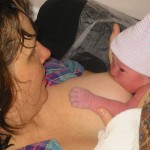 When I held my son in my arms for the first time, awe welled up within me as I gazed into his liquid, soulful his eyes. He returned my gaze, wailing to me just how difficult his journey had been, how shocking this moment was to him. I have never been so fully present a witness to someone’s story as I was at that moment.
When I held my son in my arms for the first time, awe welled up within me as I gazed into his liquid, soulful his eyes. He returned my gaze, wailing to me just how difficult his journey had been, how shocking this moment was to him. I have never been so fully present a witness to someone’s story as I was at that moment.
As a new mother, I wanted to be that present to him every moment of his life to come. I was in my late 30s, educated, a Buddhist meditation practitioner and in recovery from a massively abusive childhood. I would be everything my mother was not able to be most of my childhood: present both physically and emotionally. I would give him the experience of having a parent witness his experiences with so much love that he would grow up to be deeply connected to himself and to others, trusting that the world is a safe place.
About three days later, I was beside myself with exhaustion. My goal of being profoundly present didn’t die, but it deflated a little and cowered in the corner of my consciousness, not sure what to make of reality. Survival seemed to be a much more important goal as I contemplated returning to work in six weeks and wondered how I would do all I needed to do to provide for us both and parent well enough.
And then, when Isaac was five weeks old, my mother died unexpectedly. We were at her side when she passed, and it was as deeply soulful a moment as the one Isaac and I shared at his birth. We sat beside her all through the night, watching her breathe gasping breaths, preparing to die. I held my baby, and we comforted her and offered her our fullest, heartfelt presence as she made her transition.
In subsequent days, I stumbled around in the fog of on-going sleep-deprivation, concern about my return to work, and the task of mourning my mother while I celebrated my son. My ability to be present to the passing moments waivered. I often felt a million miles away from the joys of motherhood.
I began the long process of observing life chiseling away at my ideals. I discovered that continual presence is hard, hard work. And it is human to feel tired, anxious and distracted. Moments of crystal clear focus are often bracketed by moments of fog and fatigue.
I got knocked off my high horse of idealism, but I found a soft landing in compassion.
The first person I gained compassion for was my mother. Fortunately, it happened before she died, and I was able to tell her how much I appreciated her hard work. She’d been a schizophrenic single parent in the 1960s and ‘70s. How did she keep custody of me as long as she did? How did she relay to me the kindness and tenderness she did? I don’t know, but I do know that I came to appreciate what she accomplished, as much as I had previously recognized what she had not.
I lost my self-righteous edge toward both myself and other mothers. Presence is hard. It requires focus, and that’s difficult enough when I’m well-rested and can set aside my concerns while I meditate. With a baby, I couldn’t sit in meditation: I either fell asleep or faced constant interruptions with my baby’s needs. It was enough that I pulled myself out of my funkiness and smiled with my baby at some new-learned skill he was so proud to show me. It was enough that I took a nap when the house was messy or sent emails while I nursed.
This Mother’s Day, I want to acknowledge and praise the ideals we mothers hold dear. They inspire us to work hard and to grow into better human beings than we ever knew we could be. I want to acknowledge, too, that our ideals can be either an inspiration or a reminder that we are not enough and never will be. May we as mothers find compassion for ourselves as we so often do for our children. May we embrace our humanness with kindness and tenderness on this day when we honor the hardest work of our lives, motherhood.
